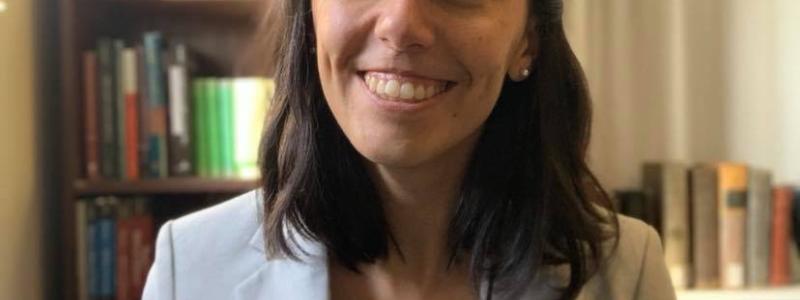"The discovery of the Dead Sea Scrolls is like a textual #MeToo moment in which previously unheard voices are finally brought to light. I am eager to see how our Christian culture will grow to incorporate these new voices, and I hope to participate in that growth."
— Shelby Bennett, MA Biblical Studies ('21)
Shelby Bennett was surprised and intrigued by something she saw—or rather, didn't see—in the Bible.
"As someone who grew up reading the Bible regularly, I was particularly shocked by how much silencing I had never even noticed. I could have given the names of female Bible characters like Sarah, Bathsheba, Tamar, or Mary Magdalene, but I had never before recognized that these women are almost completely silent," she said.
This March, Bennett defended her thesis, "Silenced Voices: Hearing Biblical Women through the Genesis Apocryphon Scroll," and successfully completed her Master of Arts in Biblical Studies at TWU. She previously graduated with a degree in Applied Linguistics and a minor in Biblical Studies.
Native to Portland, Oregon, Bennett shares that her post-grad dreams are "to find ways to share biblical studies knowledge through workshop-style classes that are accessible to anyone."
"I want to help build a bridge between academic biblical studies and the church," she says, "providing helpful information to curious readers of the Bible, and continuing to advocate for women's voices in biblical endeavors."
Here below, we interviewed Bennett to hear more about her research, and the discoveries that surpised her:
Hi Shelby Bennett, what are some highlights from your research? What surprised you the most?
There were many surprises as I studied women’s voices in the Genesis Apocryphon, some encouraging and others painful. I was surprised by the extent to which women are silenced in many biblical texts. As someone who grew up reading the Bible regularly, I was particularly shocked by how much silencing I had never even noticed. I could have given the names of female Bible characters like Sarah, Bathsheba, Tamar, or Mary Magdalene, but I had never before recognized that these women are almost completely silent. When I found out that women speak for just 1% of the Bible, I was emotionally taken aback because I realized for the first time that the Bible is missing the voices of women. But my research also opened up a new way to read the Bible. As I learned about the many texts that surrounded now-biblical texts in a time before “Bible” and “canon,” I discovered new voices. For example, the Genesis Apocryphon – from about 200–300 BCE – retells stories from Genesis and gives women presence, identity, voice, and agency, highlighting the silence and invisibility of women in Genesis. Texts like this show us that Jewish scribal and religious culture continually adapted and updated biblical stories and did not see texts like Genesis as perfect or complete. After all, how could they be complete when they only represent half of us?
How does your research inform society’s view of women and gender?
The #MeToo movement was a cultural eruption as women broke the silence around their abuse, both inside and outside Christianity. Even within the church, women used the hashtag #ChurchToo to demonstrate how their voices have been dismissed, disbelieved, or intimidated into silence. Why does this happen? My research exposes some of the foundations upon which our society’s view of women and gender have been built. For nearly all of Christian history, the Bible has depicted women who are passive and silent, if mentioned at all. When we interpret the Bible as the ultimate authority and example of gender roles, we will come away with a framework that oppresses and silences women, seeing us as somewhere between secondary and irrelevant. Allowing other texts and voices to inform and supplement our reading of the Bible – as ancient Jews practiced – will begin to equalize our Christian and cultural perceptions of women.
What do you wish to celebrate when it comes to women and Biblical history?
I want to celebrate women’s voices, but that celebration itself comes with lament. The fact that my research is necessary grieves me. The fact that I may never know the experiences of so many biblical women grieves me. The fact that I grew up with a sacred text in which I was secondary to men grieves me. But I do have great hope. The discovery of the Dead Sea Scrolls is like a textual #MeToo moment in which previously unheard voices are finally brought to light. I am eager to see how our Christian culture will grow to incorporate these new voices, and I hope to participate in that growth. If we can begin to acknowledge the patriarchy of the Bible and seek out the missing voices, I believe we will discover a more beautiful and holistic view of humanity and God. That will be something worth celebrating!
See also: Shelby Bennett, winner of Trinity Western’s 3-Minute Thesis (3MT) competition 2020,
competed in the 3MT Western Regionals:
TWU News
About Trinity Western University
Founded in 1962, Trinity Western University is Canada’s premier Christian liberal arts university dedicated to equipping students to establish meaningful connections between career, life, and the needs of the world. It is a fully accredited research institution offering liberal arts and sciences, as well as professional schools in business, nursing, education, human kinetics, graduate studies, and arts, media, and culture. It has four campuses and locations: Langley, Richmond-Lansdowne, Richmond-Minoru, and Ottawa. TWU emphasizes academic excellence, research, and student engagement in a vital faith community committed to forming leaders to have a transformational impact on culture. Learn more at www.twu.ca or follow us on Twitter @TrinityWestern, on Facebook and LinkedIn.
For media inquiries, please contact: media@twu.ca

